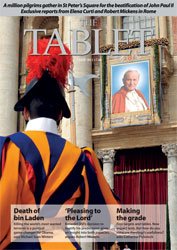John Paul II’s legacy
 Soon after the election of Pope John Paul I in 1978, Cardinal Basil Hume declared his complete conviction that the conclave in which he had just taken part had discerned the will of God. Not long afterwards, he was back in Rome after one of the shortest papal reigns in history, participating in the election of John Paul II.
Soon after the election of Pope John Paul I in 1978, Cardinal Basil Hume declared his complete conviction that the conclave in which he had just taken part had discerned the will of God. Not long afterwards, he was back in Rome after one of the shortest papal reigns in history, participating in the election of John Paul II.
The ways of the Holy Spirit are sometimes inscrutable, and the cardinal must have wished he had not jumped to hasty conclusions. This is the reason why some commentators, by no means hostile to the momentous achievements of Pope John Paul II, have been critical of the decision to take forward the process of his canonisation so soon after his death.
His beatification last weekend was authorised after the Vatican declared that the cure of a French nun suffering from Parkinson’s disease was miraculous. Might it not have been wiser, for instance, to see if the cure stood the test of time?
This is not to question the sanctity of John Paul II, which was manifest, nor to deny that he is in heaven – as are millions of souls (including popes) the Church has never seen fit to canonise – nor even that he was indeed “great” in whatever sense people want to use the term.
Canonisations are official acts of the Catholic Church for reasons which are more to do with the living than with the dead. John Paul II himself, for instance, canonised more saints than any previous pope because he felt the faithful needed modern role models and heroes. But his own life was so extraordinary that the idea of it as a role model is hardly relevant.
Pope Benedict’s decision to accelerate the canonisation process seems to have more to do with his personal devotion to his predecessor and his wish to convey a sense that the policies of Pope John Paul II were divinely blessed or even divinely sanctioned. That could look like an attempt to cut short or even to prejudge the process of historical evaluation.
If John Paul II made mistakes, the Church needs to know what they were and to learn from them. It appears to have been during his papacy, for example, that the instances of child abuse by members of the clergy grew to grievous proportions, doing immeasurable damage to individuals and to the Church that will last for decades.
The questions this raises about John Paul II’s legacy have hardly yet been asked, let alone answered. Similarly, he steered the Church away from some of the more progressive interpretations of Vatican II then on offer. Was that a timely rescue or a missed opportunity? It would be a mistake harmful to the Church to regard the beatification and eventual canonisation of Pope John Paul II as putting his papacy beyond criticism. None of these factors detracts from the admiration and gratitude that is Pope John Paul II’s due, for a remarkable and even astonishing papacy.
Unlike a democratic state, the Church does not have an alternative government in waiting, free to criticise. Instead, it falls to each pope to evaluate the priorities of his predecessor, and if necessary to shift the emphasis. In subtle ways, Pope Benedict has indicated that he understands that. But he may have made his task more difficult by sending out the opposite signal.


 Votes : 0
Votes : 0









